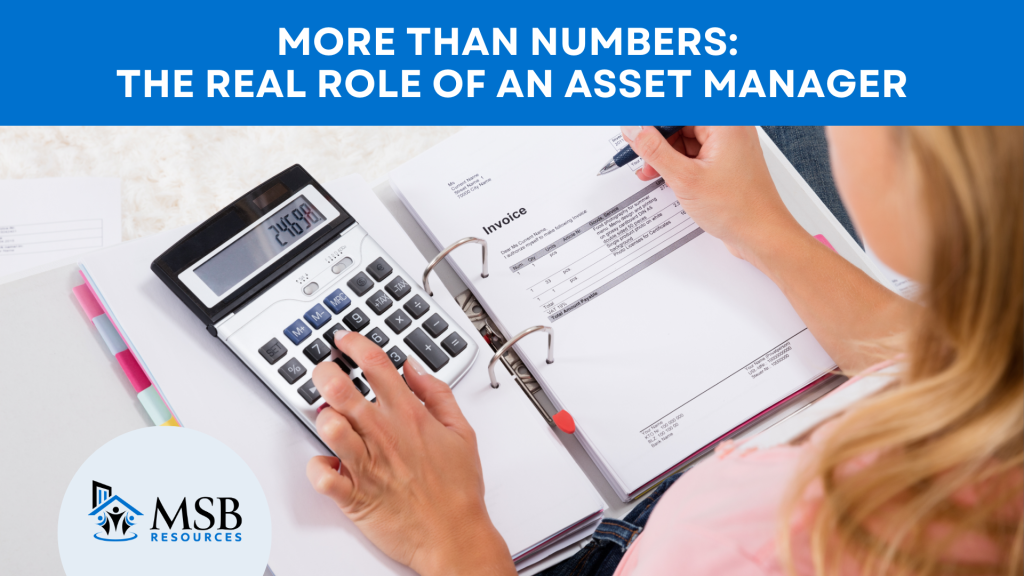If you think asset managers are just number crunchers, you’re missing the whole picture. They’re the quarterbacks of apartment communities, overseeing everything from budgets and renovations to staffing, marketing, and performance. Their goal isn’t just to balance the books; it’s to ensure properties run smoothly and profitably, meeting both resident needs and investor goals.
The role blends operations, strategy, leadership, and finance, making it far more dynamic than it sounds.
In our new LinkedIn Live series, Tara Samuels sits down with asset managers Melissa and Dan to reveal the real impact of the role and why it’s so much more than just numbers. Throughout this article, you’ll find valuable insights and tips straight from the video that you can watch for more in-depth discussions.
Dan (watch here): “People think asset managers just show up on site to say no, but our goal is to make teams thrive and achieve higher than they expect.”
Here’s what the role really looks like, on paper and in practice.

The Big Picture: Portfolio Oversight
Asset managers oversee entire portfolios of apartment communities, not just individual properties. It’s like being a master chess player where every move affects multiple boards at once. They’re responsible for juggling multiple moving parts: from budgets and renovations to staffing, marketing, and overall performance optimization. This requires not only strong financial acumen but also a strategic mindset to ensure both resident satisfaction and investor returns.
Each property in the portfolio requires a tailored approach. Market conditions, performance metrics, and the specific needs of each community all come into play. This means asset managers must be constantly adaptable, adjusting strategies to ensure each property thrives.
As Dan puts it, “The quarterback has to know what everybody is doing and can only be successful if everyone else does their job.” Watch here.
Melissa adds, “You’re the facilitator for high-level operations, mapping out plays and reporting to the front office.” Watch here.
Pro tip: Think of asset managers as a blend of operations manager, financial analyst, and project coordinator. They wear many hats to ensure everything runs smoothly across the portfolio.
Partnership with Property Management
Asset managers work closely with property managers to ensure properties hit performance benchmarks and operational goals. This partnership is crucial for improving day-to-day operations, solving issues, and making tough decisions when a property isn’t performing up to standard.
While asset managers focus on the big-picture strategy, property managers handle the on-the-ground execution. Asset managers still provide support, guidance, and mentorship, making sure that the corporate objectives align with the realities of running a property. It’s a delicate dance that requires both diplomacy and decisive leadership.
Melissa explains, “One day I could be interfacing with equity partners, the next I’m selecting paint schemes, and the next I’m strategizing revenue with regional teams.” Watch here.
Pro tip: Building strong relationships with property managers is key to executing successful business plans across your portfolio.
Hands-On Field Work
Forget the stereotypical office-bound executive. Asset managers aren’t stuck behind desks all day. A significant part of their role involves regular property visits to assess everything from curb appeal and renovations to amenities and the overall resident experience. These on-site visits are crucial because the physical condition of properties directly impacts both resident satisfaction and asset value.
Being present at the properties allows asset managers to identify potential issues before they become costly problems. Whether it’s identifying maintenance needs, evaluating the success of recent upgrades, or simply gauging residents’ responses to changes, this hands-on approach is essential. The role does require travel flexibility, as asset managers typically oversee multiple properties across different locations.
Melissa emphasizes that every day is different, from partner meetings to operations calls to site-level decisions. Watch here.
Pro tip: Successful asset managers spend significant time on-site, not behind a desk. The best insights often come from walking the property and talking to residents and staff.
Project Leadership and Renovations
When it comes to major property upgrades, asset managers take the lead in coordinating teams of suppliers, contractors, and design professionals. They’re responsible for managing renovation timelines and budgets for everything from clubhouse makeovers and unit interiors to adding new amenities that enhance the resident experience.
Picture this: you’re juggling contractors, designers, and executives who all want different things, all on different timelines. This aspect of the role requires strong project management skills, as asset managers must balance multiple moving parts while keeping projects on track and within budget. In this chaos, communication isn’t just helpful, it’s your lifeline. They serve as the central communication hub between design teams, contractors, and senior executives, ensuring everyone stays aligned on goals and expectations. The challenge lies in balancing project costs with expected returns on investment, making strategic decisions about where to allocate renovation dollars for maximum impact.
Dan shares his approach: “When we put together a renovation scope, I’m not just looking at ROI. I’m asking, would Joanna Gaines be proud of us?” Watch here.
Pro tip: Strong communication and coordination skills are crucial when managing multiple vendors. Clear expectations and regular check-ins prevent costly delays and misunderstandings. In the world of renovations, diplomatic urgency is an art form worth mastering.
Financial Analysis and Strategy
While asset managers do much more than crunch numbers, financial analysis remains a core component of their role. Don’t let anyone fool you—the numbers tell stories, and asset managers need to be fluent in that language. They conduct monthly and yearly budget analysis, review performance reports, and track key metrics like delinquencies to understand how each property is performing. This data drives strategic recommendations aimed at maximizing returns for investors and stakeholders.
The financial side involves using data to make property-level decisions and develop long-term planning strategies. Asset managers must constantly balance operational costs with revenue optimization opportunities, looking for ways to improve the bottom line without compromising the resident experience. It’s about applying financial knowledge practically to real-world property challenges rather than just theoretical number-crunching.
Dan explains that revenue management, forecasting, and reporting are core parts of his daily routine. Watch here.
Melissa adds that CapEx management, cash flow oversight, and monthly reporting for investors are central to her role. Watch here.
Pro tip: Financial acumen is essential, but it’s applied practically to real-world property challenges. Understanding the story behind the numbers is just as important as the calculations themselves..
Essential Skills and Daily Realities
Think you can handle multiple personalities, tight deadlines, and constantly shifting priorities? Welcome to asset management! Asset management requires a unique blend of strategic thinking, organization, collaboration, and resourcefulness. The role involves managing different personalities across various teams while knowing when to step in and provide direction versus when to let your team shine. Each day brings different challenges depending on which properties or projects need attention, making adaptability one of the most crucial skills for success.
No two properties or situations are identical, which means asset managers must be flexible in their approach and quick to adjust strategies based on changing circumstances. The fast-paced nature of multifamily real estate demands strong decision-making skills and the ability to think on your feet. Travel flexibility is also important, as the role requires regular visits across property portfolios.
Dan emphasizes, “Be curious. Ask questions, even obvious ones. Adaptability is everything because market cycles shift.” Watch here.
Melissa adds, “Quick decision-making is critical. Multifamily is fast-paced, and leadership is essential because you’re the face of the brand for investors.” Watch here.
Pro tip: Travel flexibility is important as the role requires regular property visits across portfolios. Embrace the variety, as it keeps the work interesting and gives you valuable insights into different markets.
Final Thoughts
Asset managers truly are the “unsung heroes” of the multifamily world, doing far more than their title suggests. They ensure apartments not only look good and run efficiently but also attract residents and hit the financial goals that keep investors satisfied. The role offers incredible variety, strategic challenges, and the opportunity to make a direct impact on both resident experience and business success.
For those considering a career in asset management, the professionals we spoke with offered valuable advice. The role requires curiosity, adaptability, and strong technical skills, but it rewards those willing to embrace its complexity with diverse experiences and meaningful responsibility
Job descriptions barely tell half the story. Ready for the unfiltered truth about what asset managers really do? Watch the LinkedIn Live replay with Melissa and Dan, you’ll never look at asset management the same way!


